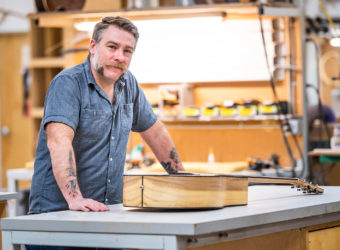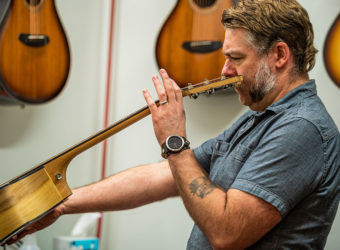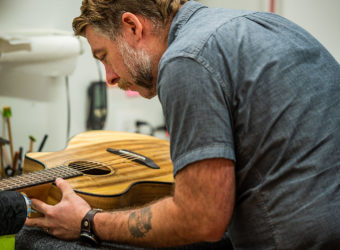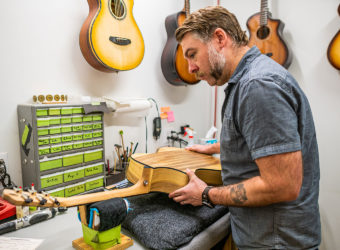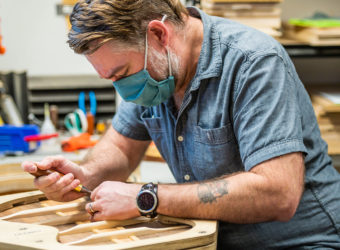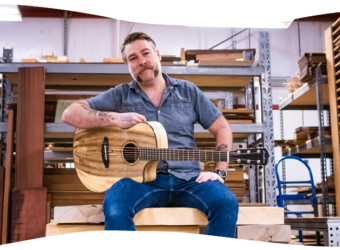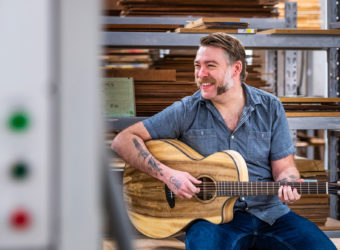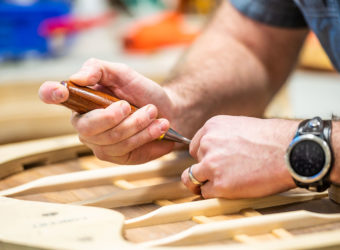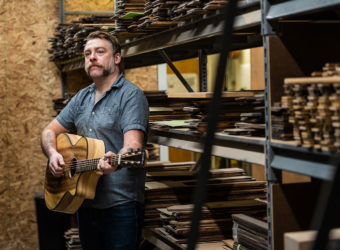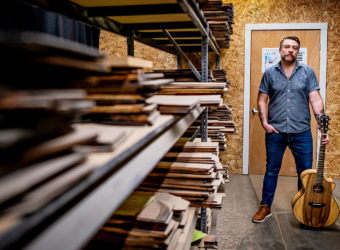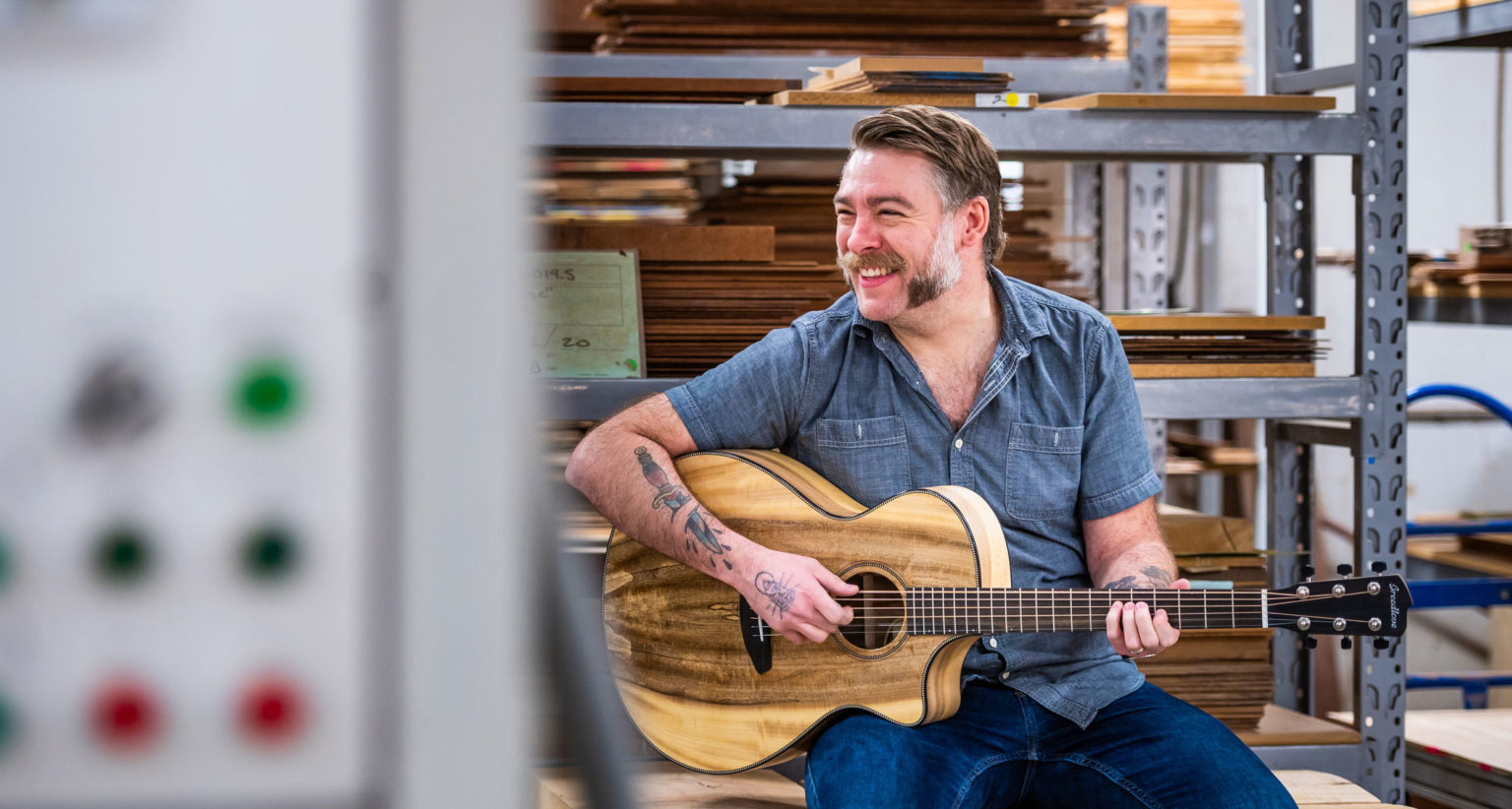
This month, we’re celebrating one of our own. January’s featured artist is Ian Cook, lead guitarist and vocalist for the infamous Oregon band Larry and His Flask (LAHF). LAHF has been around for almost two decades, evolving from a teenage “crappy punk band” into an all-acoustic sextet that channels the punk ethos and energy into a marture sound grounded in American roots music. They recorded over a dozen albums and toured all over the world before putting the project on pause in 2019.
Ian also just happens to be the Sound Optimization tech here at the Breedlove workshop. He brings decades of experience as a songwriter and working musician into the shop every day. Ian sound tests every Made in Bend guitar we produce. (In other words, he’ll get to play your dream guitar before you ever lay eyes on it.) We sat down with Ian to learn a bit more about his musical journey, his legendary band, and how all that experience and insight helps us build better guitars.
Ian Cook on Playing Blues Bar Gigs at 11
I started playing guitar when I was nine. My dad was a player, and my parents were totally supportive. I was really into blues at the time, and they’d take me to local bars to play in open blues jams when I was probably 11 years old. I would sit in with these dudes, work on my chops. I got a good feel for music in general just by doing it, just being thrown in the fire.
The Origins of Larry and His Flask
When I got a little older and the teen angst started to kick in, I found punk rock. In high school, I met the dudes that ended up being in Larry and His Flask, who became the band that I spent most of my musical career with. We formed that band when I was a sophomore. I was 16 on my very first tour. I can’t believe my parents let me go, but we went to California one summer. I think we were gone for two weeks. We played about five shows.
Folk as Proto-Punk
We were just a really crappy punk band for a long time. As we got older, we were all growing out of the punk thing. We started looking deep into the history of American music, roots music, traditional folk stuff—Jimmy Rogers, Woody Guthrie—and getting into the movement aspect. Because folk was punk before punk was punk. It was protest music. It had the same fighting spirit but there was more musicality.
Musical Evolution
I was a more advanced player than most people my age, certainly most punk guitarists. From a technical aspect, we were listening to some of the bluegrass guys, like doc Watson and Norman Blake, all the flat-picking stuff, it was just insane. We were drinking everything in. Gypsy jazz, like Django Reinhardt. I was immersing myself in more traditional acoustic guitar playing. And we started to infuse that into what we did. So, we decided to break the band down and go completely unplugged. Over that winter, our bassist brewed a bunch of apple cider that was pretty over-fermented. We just passed the jugs around, and passed the songs around, and jammed throughout that whole winter. And by the time we emerged on the other side, we had something approaching a cohesive band.
The Post-Americana Label
Folk-punk or folk-rock is what you could call our music, really, but that was so generic. We eventually landed on the post-Americana label as a joke, the degradation of American music, essentially. It’s like an elliptic version of American music with everything but the kitchen sink thrown in. There’s no clean differentiation between styles; it’s all just this weird amalgam.
Acoustic Mosh Pits
Acoustic mosh pits can get a little hairy. There’s a reason heavier bands play sturdy instruments. We had a few feet punch through the standup base, some holes in the acoustic guitars. A few broken banjo heads. [Stuff] happens. Most of the time we found ourselves in environments where mosh pits were a norm. We’d be the only acoustic band on a punk show. There really wasn’t a place for us in your typical, sit down, folky vibe kind of show. We were a little early on the whole punk infusion into acoustic music. The bluegrass community wanted nothing to do with us, and at the same time, the punk community didn’t really know what to do with us either.
Songwriting on the Clock
Here at Breedlove, I have constant access to guitars, so I’ll write riffs at work. I’ve actually come up with the structure of a song and then written all the lyrics at work. There’s a handful of songs on my new record that I wrote here. I’ll be testing a guitar, work little parts out, go do something else, pick up another a guitar and work out another section. While I’m building and testing guitars, I’m also piecing together songs. I’ve never been able to do that at a job before, so that’s amazing.
Ripping On Other People’s Dream Guitars
Being an experienced guitarist, I understand the qualities and the details that are important to a professional guitar player. I’m involved with our American guitars all the way from the beginning of the process to final shipping. I pick all the sets of wood. I sand them down. I test their frequencies as raw wood. Once the bodies get put together, I test the frequencies again before they have any finish or anything on them to make sure every guitar is on track to be as close to perfect as we can get it. And then I get to actually play them once they’re finished and strung up. I play every guitar before it leaves. If it’s not right, I’ll do very delicate chiseling or sanding until it is. Once they’ve passed my play test, I do a final clean up, and bag them for shipping. I get to rip on people’s dream guitars before they even get to touch them.
